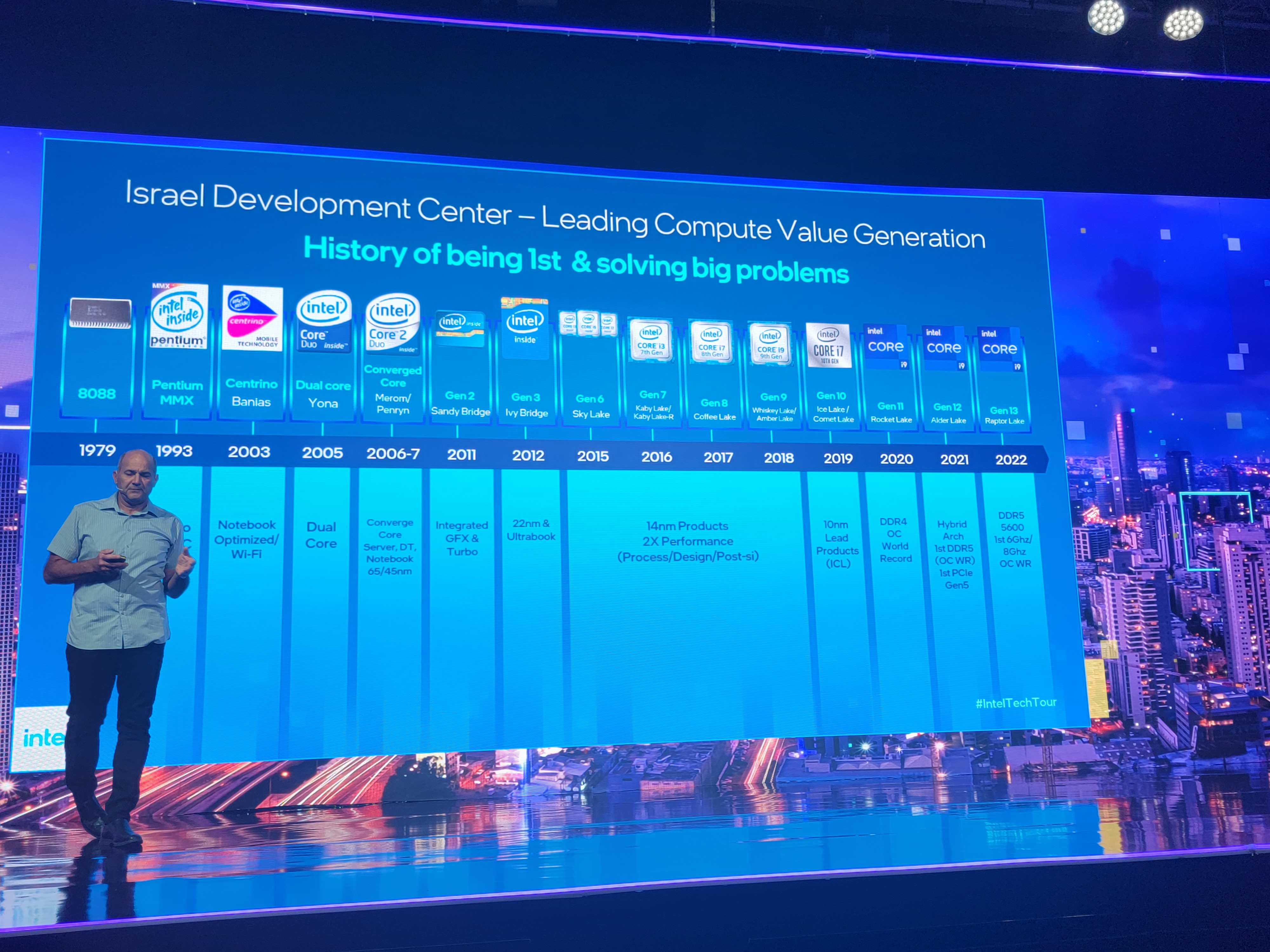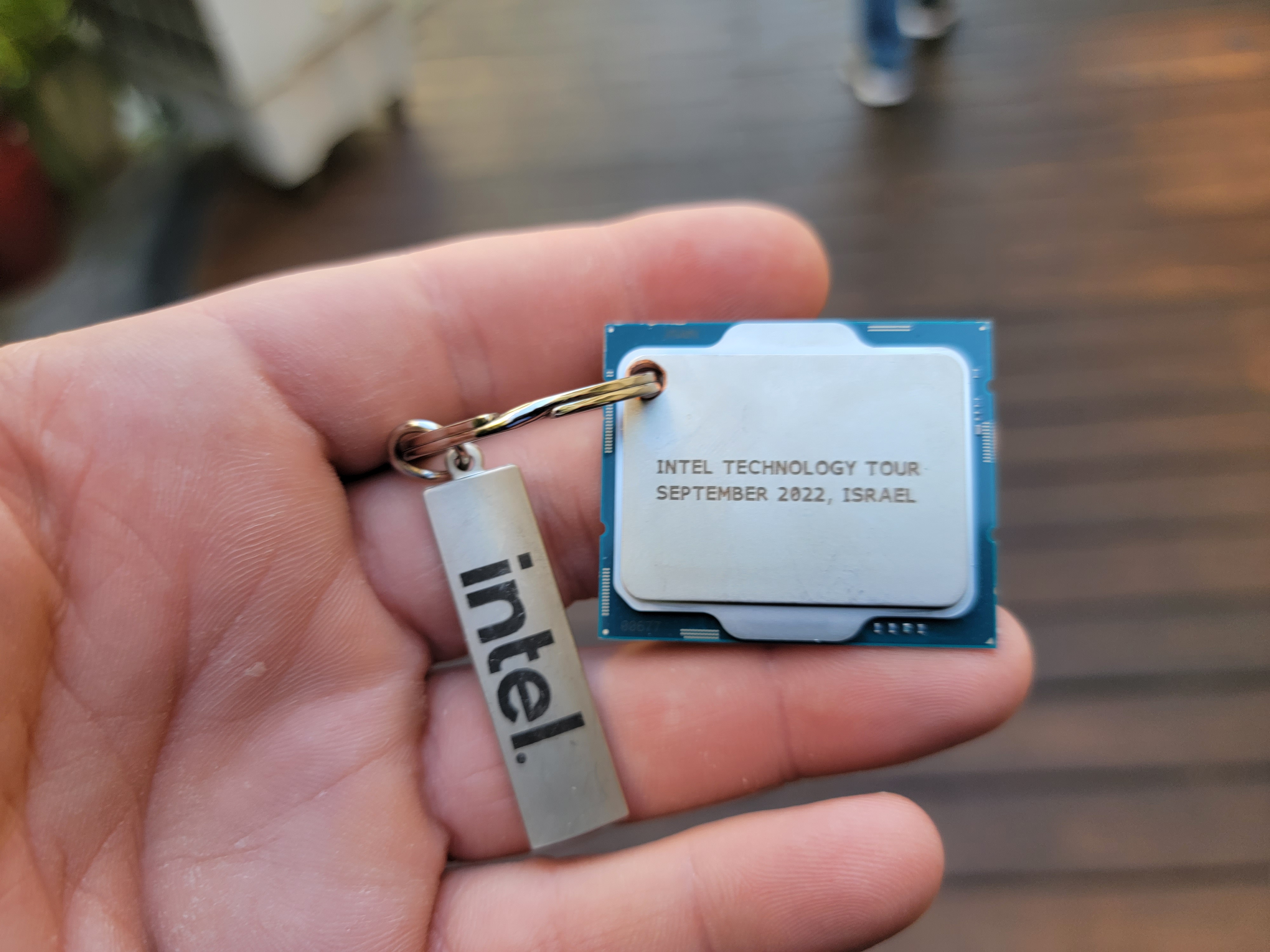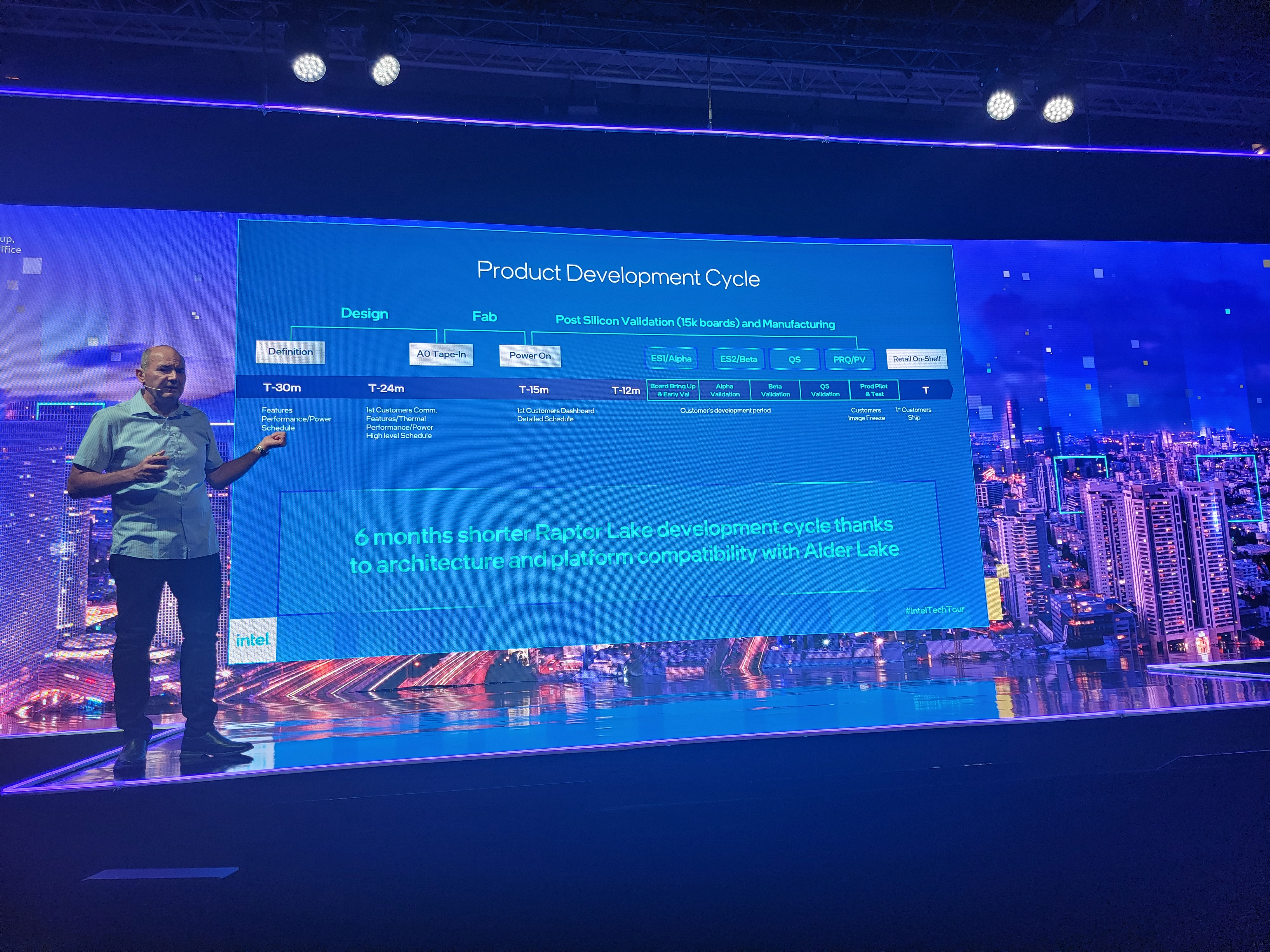Intel Teases 6 GHz Raptor Lake at Stock, 8 GHz Overclocking World Record
The Raptors are out of the cage...

We're here in Israel for Intel's Technology Tour 2022, where the company is sharing new information about its latest products, much of it under embargo until a later date. However, the company did share a slide touting that Raptor Lake is capable of operating at 6GHz at stock settings and that it has set a world overclocking record at 8GHz - obviously with liquid nitrogen (here's our deep dive on the 13th-Gen Intel processors). Intel also shared impressive performance projections for single- and multi-thread performance.
Notably, the peak of 6 GHz is 300 MHz faster than the 5.7 GHz for AMD's Ryzen 7000 processors, but Intel hasn't announced which product will hit that peak speed. We also aren't sure if a 6GHz chip will arrive with the first wave of chips or be a special edition 'KS' model. Intel also claimed that Raptor Lake will have a 15% gain in single-threaded performance and a 41% gain in multi-threaded, as measured by SPECintrate_2017 and compared to Alder Lake, and an overall '40% performance scaling.'
You can see the 6GHz stock clocks and 8 GHz world record listed in the last entry in the above timeline. The Israel Development Center (IDC) has been the design engine behind a long line of Intel products spanning back to the 8088 that started it all back in 1979 (here's a look back). That lineup spans until today, encompassing well-known names like Pentium MXX, Banias, Sandy Bridge, and many others.

All of this culminates, at least for now, with the 13th-gen Raptor Lake processors that Intel will formally announce soon, though the company obviously has many other designs in the pipeline, like Meteor Lake, Lunar Lake, and other processors on the company's roadmaps.
Aside from the teaser about the 6 GHz peak operating clocks at stock and the new 8 GHz overclocking record for Raptor Lake (though we aren't sure if it is the overall world record or merely a world record for Intel's 10nm chips), the company hasn't shared more details yet. Naturally, more information will follow during the NDA'd meetings held over the next several days, and we'll share that information soon. We're particularly interested to learn pricing and power consumption details, though we already know most of the details of the specs. You can see those in our Raptor Lake all we know.

Intel is also sharing much more information about its design and validation process, with the slide above touting that the Raptor Lake development cycle was eight months shorter due to backward compatibility with Alder Lake.
This quick turnaround time was necessary because the Raptor Lake chips weren't on the roadmap as little as two years ago -- Intel only added the chip to its roadmap because a 'future product' was delayed (presumably Meteor Lake, though we haven't confirmed).

Intel has been very forthcoming with details so far, sharing interesting details like the image above -- for instance, this handwritten checklist is the first list of design goals for Alder Lake.
We're here at the event for the next several days and will have more coverage soon.
Get Tom's Hardware's best news and in-depth reviews, straight to your inbox.
- MORE: AMD vs Intel
- MORE: Raptor Lake All We Know
- MORE: Zen 4 Ryzen 7000 All We Know

Paul Alcorn is the Editor-in-Chief for Tom's Hardware US. He also writes news and reviews on CPUs, storage, and enterprise hardware.
-
jp7189 Is anyone else have netburst de ja vu? Clockspeed, power, and heat are jumping to new heights to keep pace with competition thats rocking a fundamentally more efficient core.Reply -
InvalidError Reply
Between increased complexity and higher clocks, AMD's TDPs are skyrocketing too.jp7189 said:Is anyone else have netburst de ja vu? Clockspeed, power, and heat are jumping to new heights to keep pace with competition thats rocking a fundamentally more efficient core.
Netburst's worst problem was that performance gains significantly lagged the TDP increases most of the time. As long as performance scales at least linearly with power, the overall system power efficiency is still improving. -
jp7189 Reply
I think it's highly unlikely P cores will be more efficient at 6GHz. I think we'll see a regression in efficiency in the P cores this gen. No doubt that will be offset in the real world by extra E cores that will bring up overall efficiency of MT scores. Still, I think my point will still stand that Intel is burning substantially more power to hit 6GHz than the increase in performance warrants.InvalidError said:Between increased complexity and higher clocks, AMD's TDPs are skyrocketing too.
Netburst's worst problem was that performance gains significantly lagged the TDP increases most of the time. As long as performance scales at least linearly with power, the overall system power efficiency is still improving. -
Kamen Rider Blade Reply
Most of Intel's DeskTop & Power Users don't care for efficiency; they just want to their programs to "GO FAST" & they'll burn every extra watt necessary to get that higher frequency.jp7189 said:I think it's highly unlikely P cores will be more efficient at 6GHz. I think we'll see a regression in efficiency in the P cores this gen. No doubt that will be offset in the real world by extra E cores that will bring up overall efficiency of MT scores. Still, I think my point will still stand that Intel is burning substantially more power to hit 6GHz than the increase in performance warrants.
Efficiency be damned.
Having the E-cores is a waste of Silicon Space on Intel's Desktop CPU line.
Let the E-cores be Intel's crutch to power consumption on mobile.
Desktop doesn't need it & doesn't care. -
RodroX Seems there are still people in the world who cares about high frecuency max/turbo clock speed.....Reply
OC records are awesome to read and watch, the amount of effort put into achieving that goal is great. And the works/fixes/improvements around it that may leak to "average" users is welcome too.
Im on the efficiency/performance boat. Give me something that performs well enough and does not need a power generator and air conditioner to work with and I will be happy.
We will see when we get a real product to test if any of this claims (specially the 6GHz) are real, and also what do you need in order to get that high turbo frecuency.
I still have hopes about the 4 Millon intel GPU on the street for 2022.... come on intel bring them on!!! -
InvalidError Reply
The bulk of Intel's desktop sales are to corporations and institutions via OEMs running CPUs at or below specs where they are far more efficient than in the small yet very vocal "efficiency can go to hell" enthusiast circles here where everything that has a power slider goes all the way to the top/right.Kamen Rider Blade said:Most of Intel's DeskTop & Power Users don't care for efficiency; they just want to their programs to "GO FAST" & they'll burn every extra watt necessary to get that higher frequency.
Efficiency be damned. -
Kamen Rider Blade Reply
We, the "Vocal Minority" of 'PC enthusiasts' care about this 8 GHz World Record.InvalidError said:The bulk of Intel's desktop sales are to corporations and institutions via OEMs running CPUs at or below specs where they are far more efficient than in the small yet very vocal "efficiency can go to hell" enthusiast circles here where everything that has a power slider goes all the way to the top/right.
Intel makes entire product stacks just for us "Enthusiasts".
The OEM's can run their "Below Specs" CPU SKU's.
Normies don't OC or care about what hardware is in their PC.
They're not 'PC enthusiasts' like us who care about every little detail.
We "Enthusiasts" will be catered to, and the Product Stack existing proves that; along with 8 GHz OCing records like this. -
Sippincider ReplyKamen Rider Blade said:Most of Intel's DeskTop & Power Users don't care for efficiency; they just want to their programs to "GO FAST" & they'll burn every extra watt necessary to get that higher frequency.
Efficiency be damned.
To an extent. The standard North American 110 volt outlet is “only” going to deliver ~1700 watts, so unless we want 20 amp or 220 volt power there is a ceiling (assuming cooling keeps pace). -
Kamen Rider Blade Reply
Almost all of modern PC designs are Power Limited to the US House Hold Circuit wattage limit.Sippincider said:To an extent. The standard North American 110 volt outlet is “only” going to deliver ~1700 watts, so unless we want 20 amp or 220 volt power there is a ceiling (assuming cooling keeps pace).
I doubt the EU or other 2## Volt countries want more power consuming PC's anyways given how "Green they want to be" by telling the world that things must be "More efficient" & "Consume Less Power". So they're more than happy to limit the power consumption of the average persons home computer by US House Hold Circuit Wattage limits.